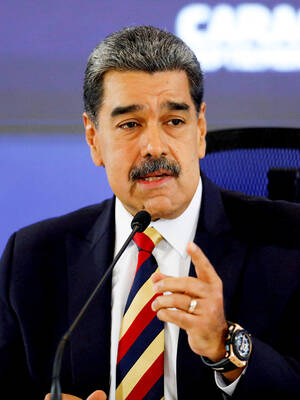China is planning to offer cash handouts to families as an incentive for couples to have children, as years of population decline threaten the world’s No. 2 economy, people familiar with the matter said.
The Chinese government is set to provide 3,600 yuan (US$502) a year for each child until they turn three under a nationwide initiative starting this year, said the people, asking not to be identified as the details are not public.
While China abandoned its one-child policy about a decade ago, its population registered a decline for three straight years through last year. New births at 9.54 million last year were only half of the 18.8 million registered in 2016, when China lifted the policy that allowed couples to have only one child.

Photo: AFP
Diminishing birthrate is a challenge for Beijing, where the working-age population has been shrinking, in a threat to labor supply and productivity.
China, which lost its title as the most populous nation to India in 2023, might see its population drop further to 1.3 billion by 2050 and below 800 million by 2100, according to the UN’s demographic modeling.
That outlook stems from a significant drop in marriage rates, which hit its lowest level in almost half a century and could lead to even fewer births.
The trend has already prompted many local governments to roll out measures, from offering cash incentives to providing housing subsidies, to help alleviate families’ financial burden and encourage births.
Local subsidies, in some cases, can be quite significant. Hohhot, the regional capital of Inner Mongolia, made national headlines in March for its subsidies of 50,000 yuan to couples who have a second child and 100,000 yuan for a third or more.

VENEZUELAN ACTION: Marco Rubio said that previous US interdiction efforts have not stemmed the flow of illicit drugs into the US and that ‘blowing them up’ would US President Donald Trump on Wednesday justified a lethal military strike that his administration said was carried out a day earlier against a Venezuelan gang as a necessary effort by the US to send a message to Latin American cartels. Asked why the military did not instead interdict the vessel and capture those on board, Trump said that the operation would cause drug smugglers to think twice about trying to move drugs into the US. “There was massive amounts of drugs coming into our country to kill a lot of people and everybody fully understands that,” Trump said while hosting Polish President

A French couple kept Louise, a playful black panther, in an apartment in northern France, triggering panic when she was spotted roaming nearby rooftops. The pair were were handed suspended jail sentences on Thursday for illegally keeping a wild animal, despite protesting that they saw Louise as their baby. The ruling follows a September 2019 incident when the months-old feline was seen roaming a rooftop in Armentieres after slipping out of the couple’s window. Authorities captured the panther by sedating her with anesthetic darts after she entered a home. No injuries were reported during the animal’s time on the loose. The court in the

Japan yesterday heralded the coming-of-age of Japanese Prince Hisahito with an elaborate ceremony at the Imperial Palace, where a succession crisis is brewing. The nephew of Japanese Emperor Naruhito, Hisahito received a black silk-and-lacquer crown at the ceremony, which marks the beginning of his royal adult life. “Thank you very much for bestowing the crown today at the coming-of-age ceremony,” Hisahito said. “I will fulfill my duties, being aware of my responsibilities as an adult member of the imperial family.” Although the emperor has a daughter — Princess Aiko — the 23-year-old has been sidelined by the royal family’s male-only

For more than a century, the fate of the dazzling Darya-e-Noor diamond has been sealed inside a bank vault — a mystery that haunts Khawaja Naim Murad, great-grandson of the last prince, or nawab, of Dhaka. Locked away in 1908, were the family’s heirlooms lost during the violence at the end of British rule in 1947? Did they survive Bangladesh’s war of independence in 1971 and the string of coups that followed, or are they still safe, dusty, but untouched? Many suspect that the jewels are long gone and officials at the state-run bank hesitate to simply open the vault, fearing that they